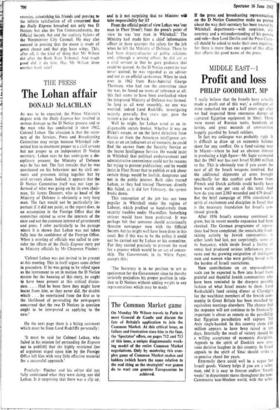The Lohan affair
THE PRESS DONALD McLACHLAN
As was to be expected, the Prime Minister's dispute with the Daily Express has resulted in serious damage to the D Notice process and to the man who has conducted it since 1962, Colonel Lohan. The situation is that the secre- tary of the Services, Press and Broadcasting Committee may resign because Whitehall sub- mitted him to treatment proper to a civil servant but not proper to an independent D Notice secretary. Lohan says he has undergone a dis- ciplinary process; the Ministry of Defence says he has not. The fact remains that he was questioned on his behaviour not by civil ser- vants and pressmen sitting together but by civil servants alone. Indeed, it appears that the D Notice Committee itself was not kept in- formed of what was going on by its own chair- man, Sir lames Dunnett, who as head of the Ministry of Defence is obviously a very busy man. The fact would not be particularly im- portant if it did not point, as the report does, to an assumption in the Foreign Office that the committee existed to serve the interests of the state and not the common interest of government and press. I refer particularly to the passage where it is shown that Lohan was not taken fully into the confidence of the Foreign Office. When a meeting of officials was called to con- sider the effects of the Daily Express story put to Ministry officials by Mr Chapman Pincher:
'Colonel Lohan was not invited to be present at this meeting. This in itself argues some defect in procedure. If he was going to be relied upon as the instrument to set in motion the D Notice system for the banning of this story, he ought to have been present at this critical discus- sion. . . Had he been there they might have learnt from him, as they never did, the doubts which . . . he entertained from the first as to the likelihood of persuading the newspapers concerned that the two D Notices in question ought to be interpreted as applying to the case.'
On the next page there is a biting comment which must be from Lord Radcliffe personally:
'It must be said for Colonel Lohan, who failed in his mission {of persuading the Express not to publish] that the highly restricted line of argument urged upon him by the Foreign Office left him with very little effective material for a successful approach.'
Precisely: Pincher and his editor did not fully understand what they were doing, nor did Lohan. Is it surprising that there was a slip up, and is it not surprising that no Minister will take responsibility for it?
From the official point of view Lohan was 'our man in Fleet Street'; from the press's point of view he was `our man in Whitehall.' The Ministry had made him a chief information officer at three quarters the salary for the job when he left the Ministry of Defence. There he had been deputy-director of public relations and, although a serving officer, he did act as a civil servant in that he gave guidance that could be quoted. As the D Notice expert he was never quoted; he was regarded as an adviser and not as an official spokesman. When he took over in 1962 from Rear-Admiral George Thomson, who had run the committee since the war, he found no terms of reference at all; this fact seems to have been overlooked when the integrated Ministry of Defence was formed. So long as all went smoothly, no one was worried; indeed Lord Radcliffe, investigating security generally five years ago. gave the system a pat on the back.
Well he might. for Lohan acted as an in- dispensable secrets broker. Whether it was on Blake's escape, or on the latest defection from Russia or from the American intelligence ser- vice, or on an indiscreet set of memoirs, he could find the answer from the Security Service or the Secret Intelligence Service. He would insist in Whitehall that political embarrassment and administrative convenience could not be reasons for trying to prevent publication; and he would insist in Fleet Street that to publish or ask about certain things would be foolish, dangerous and not in the public interest. Both sides trusted Lohan, as they had trusted Thomson; directly this failed, as it did last February, the system broke down.
This conception of the job has not been popular in Whitehall under the regime of Labour, which profited so handsomely from security troubles under Macmillan. Something stricter would have been preferred. It was perhaps felt that someone should occasionally threaten newspaper men with the Official Secrets Act (as might well have been done in this case). But if this was to be the policy it could not be carried out by Lohan or his committee. For they existed precisely to prevent the need for a process which would be an act of censor- ship. The Government, in its White Paper, accepts this:
'The Secretary is in no position to act as spokesman for the Government since be thereby seriously prejudices his proper position in rela- tion to D Notices without adding weight to any representations which may be made.' If the press and broadcasting representatives on the D Notice Committee make no protest about the way their secretary has been treated by Whitehall departments—with suspicion, d:s. courtesy and a misunderstanding of his powers and role—then Lord Devlin and the Press Coun- cil should be asked to make their own inquir:es. for there is more than one aspect of this affair that affects the good name of the press.


































 Previous page
Previous page